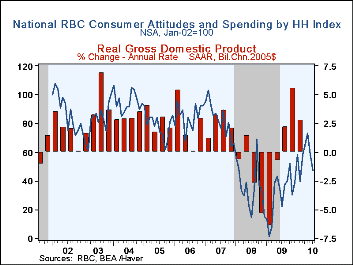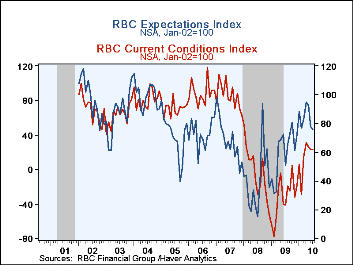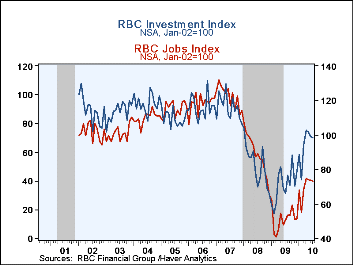 Global| Jul 21 2010
Global| Jul 21 2010U.S. CASH Index Lowest Since February
by:Tom Moeller
|in:Economy in Brief
Summary
The CASH Index is produced by the RBC Financial Group. It stands for Consumer Attitudes & Spending By Households and the overall series moves much like the University of Michigan's Index of Consumer Sentiment, but its components [...]
 The CASH Index is produced by the RBC Financial Group. It stands for Consumer
Attitudes & Spending By Households and the overall series moves much like
the University of Michigan's Index of Consumer Sentiment, but its components
differ. During July the index fell to 47.2, the second consecutive down month
since its May high. Beginning in 2002, the overall index
level has a 62% correlation with the change in real GDP.
The CASH Index is produced by the RBC Financial Group. It stands for Consumer
Attitudes & Spending By Households and the overall series moves much like
the University of Michigan's Index of Consumer Sentiment, but its components
differ. During July the index fell to 47.2, the second consecutive down month
since its May high. Beginning in 2002, the overall index
level has a 62% correlation with the change in real GDP.
Weakness within the July CASH index was largest in the Expectations and Investment components. However, the up-trends in both series remained in place. There also was a very slight decline in the Jobs component but an uptick in the Current Conditions reading. Since inception there has been an 87% correlation between the Jobs index and the m/m change in private nonfarm payrolls.
The RBC CASH Index is available in Haver's SURVEYS database.
The Semiannual Monetary Policy Report to the Congress by Federal Reserve Board Chairman Ben S. Bernanke can be found here.
| National
RBC CASH Index (Jan 2002 = 100, NSA) |
July | June | May | July '09 | 2009 | 2008 | 2007 |
|---|---|---|---|---|---|---|---|
| CASH Index | 47.2 | 58.4 | 72.7 | 22.4 | 30.0 | 36.1 | 82.6 |
| Current Conditions | 61.7 | 61.5 | 63.6 | 23.3 | 28.2 | 46.0 | 99.4 |
| Expectations | 46.1 | 49.6 | 74.2 | 4.8 | 19.5 | -12.4 | 34.3 |
| Jobs | 73.3 | 73.7 | 74.2 | 50.5 | 50.9 | 88.7 | 12.2 |
| Investment | 70.1 | 71.1 | 73.8 | 30.9 | 37.2 | 51.1 | 91.1 |
Tom Moeller
AuthorMore in Author Profile »Prior to joining Haver Analytics in 2000, Mr. Moeller worked as the Economist at Chancellor Capital Management from 1985 to 1999. There, he developed comprehensive economic forecasts and interpreted economic data for equity and fixed income portfolio managers. Also at Chancellor, Mr. Moeller worked as an equity analyst and was responsible for researching and rating companies in the economically sensitive automobile and housing industries for investment in Chancellor’s equity portfolio. Prior to joining Chancellor, Mr. Moeller was an Economist at Citibank from 1979 to 1984. He also analyzed pricing behavior in the metals industry for the Council on Wage and Price Stability in Washington, D.C. In 1999, Mr. Moeller received the award for most accurate forecast from the Forecasters' Club of New York. From 1990 to 1992 he was President of the New York Association for Business Economists. Mr. Moeller earned an M.B.A. in Finance from Fordham University, where he graduated in 1987. He holds a Bachelor of Arts in Economics from George Washington University.
More Economy in Brief
 Global| Feb 05 2026
Global| Feb 05 2026Charts of the Week: Balanced Policy, Resilient Data and AI Narratives
by:Andrew Cates








